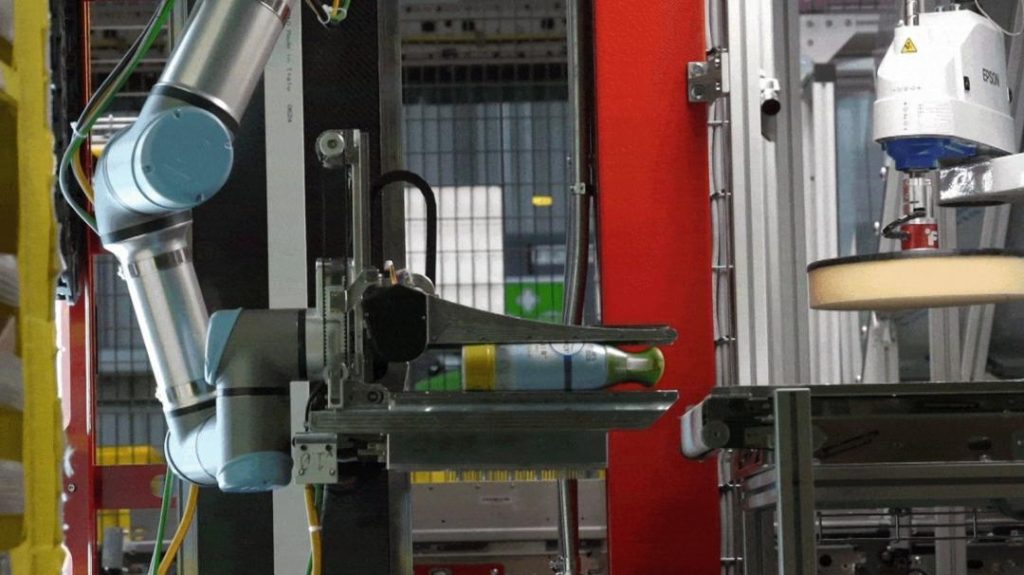
Amazon’s new robot advances automation, threatens warehouse jobs
In a recent development, Amazon has introduced its latest innovation, Vulcan, a cutting-edge robot designed to handle complex warehouse tasks. The new technology is touted to improve safety and efficiency, a significant step in the company’s ongoing quest for automation. However, the introduction of Vulcan has raised concerns about widespread job displacement among warehouse workers, who may have limited retraining opportunities.
Amazon’s move towards automation is not new. The company has been investing heavily in robotics and artificial intelligence (AI) to streamline its operations and reduce labor costs. In 2020, Amazon acquired warehouse robotics company Canvas Technology, a move that marked a significant step towards further automating its logistics. Now, with the introduction of Vulcan, Amazon is taking its automation efforts to the next level.
According to Amazon, Vulcan is designed to handle tasks such as inventory management, order fulfillment, and packaging, tasks that were previously performed by human workers. The robot is capable of working around the clock, without breaks, and is designed to work alongside humans in a shared warehouse environment. Amazon claims that Vulcan improves safety by reducing the risk of accidents and injuries, and also increases efficiency by reducing the time it takes to complete tasks.
While the introduction of Vulcan is designed to improve Amazon’s operations, it has raised concerns about the impact on warehouse workers. Warehouse jobs are already known to be physically demanding and low-paying, and the introduction of automation could exacerbate these issues. Many workers may not have the skills or training to transition to new roles, and could be left without a job.
Amazon has attempted to address these concerns by announcing plans to retrain some workers for robot maintenance roles. The company has also pledged to provide training and support to workers who may be displaced by the introduction of Vulcan. However, many workers remain skeptical, and have expressed concerns about the long-term impact of automation on their jobs.
The impact of automation on jobs is a pressing issue that is being debated globally. While automation has the potential to improve efficiency and productivity, it also raises concerns about job displacement and income inequality. As automation becomes more widespread, it is essential that governments and companies develop strategies to support workers who may be displaced by new technologies.
In the case of Amazon, the company is taking a proactive approach to addressing the impact of automation on its workers. By providing training and support to workers, Amazon is attempting to minimize the disruption caused by the introduction of Vulcan. However, the company must also acknowledge the limitations of its approach and work to develop more comprehensive solutions that address the broader issues surrounding automation.
The Future of Work
The introduction of Vulcan is not just a concern for Amazon workers, but also has broader implications for the future of work. As automation becomes more widespread, it is likely to have a significant impact on the job market, with both positive and negative consequences.
On the positive side, automation could lead to improved productivity and efficiency, allowing companies to produce more goods and services with fewer resources. Automation could also lead to new job opportunities in fields such as robotics, AI, and data analysis.
However, the negative consequences of automation cannot be ignored. Job displacement is a real concern, and many workers may not have the skills or training to transition to new roles. Automation could exacerbate income inequality, as those who have the skills and training to work with new technologies may benefit more than those who do not.
In conclusion, the introduction of Vulcan by Amazon is a significant step in the company’s ongoing quest for automation. While the technology has the potential to improve safety and efficiency, it also raises concerns about job displacement and income inequality. As companies like Amazon continue to invest in automation, it is essential that they develop comprehensive strategies to support workers who may be displaced by new technologies.
Sources:
https://startupnews.fyi/2025/05/11/amazon-offers-peek-at-new-human-jobs-in-an-ai-bot-world/






